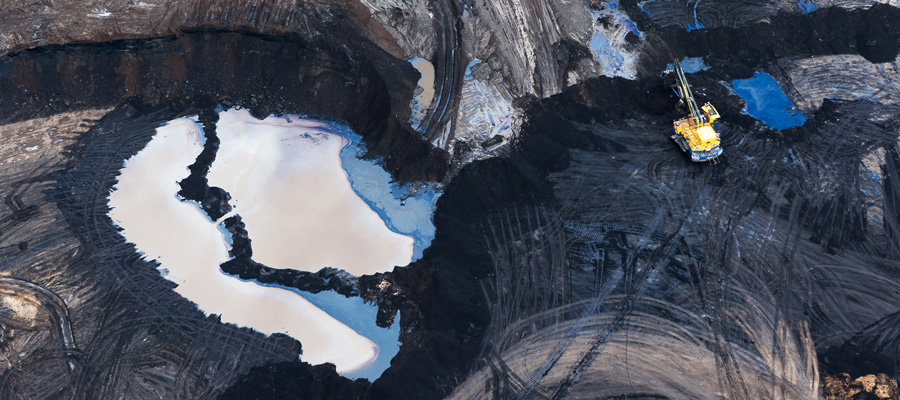Bailout for people and communities, not oil and gas industry

Canada is in an economic tailspin due to the COVID-19 pandemic, echoing the worst months of the Great Depression. Yet while millions of Canadians need support to pay for basic necessities, a powerful group of oil company CEOs and lobbyists has insisted on a multi-billion dollar handout from the federal government, to be released any day.
It is a bait and switch demand. The bait: funds for unemployed oil workers to clean up abandoned oil wells, a huge environmental liability. The switch: oil corporations want easy access to credit to keep them afloat, plus breaks on royalties and taxes, including the federal carbon tax.
Let’s not be fooled that oil companies prioritize job creation. Canada’s oil and gas sector has cut workers since 2014. It has entered a phase of permanently slow employment growth—the heyday of 2010s job growth won’t return. Instead, workers are among the first costs shed by companies to save cash, preferring automation where possible.
Let’s not be fooled that oil companies prioritize job creation.
In any case, the oil sector has already had more than its fair share of taxpayer support. The fossil fuel sector gets over $3 billion a year in subsidies in Canada based on International Institute for Sustainable Development estimates, after decades of provincial and federal support. Case in point: just this week, the Alberta government bought a $1.5 billion stake in the Keystone XL pipeline and offered another $6 billion in credit to protect the project. The COVID-19 crisis is once again underscoring that this industry can’t exist without huge public subsidies.
The oil sector was in trouble long before COVID-19: stagnating prices sunk profits, forcing some oil firms to the brink of bankruptcy. A barrel from the oil sands now costs less than a burger and a beer. But that’s mostly due to Saudi Arabia opening its oil taps. The COVID-19-induced economic slowdown is making things worse, but a government bailout now won’t stop the bleed.
The COVID-19 crisis is underscoring that this industry can’t exist without huge public subsidies.
Financial experts warned that the future of the oil sector was dim long before COVID-19 hit. Mark Carney, outgoing Governor of the Bank of England and former Governor of the Bank of Canada, emphasized in December that up to half of the world’s oil and gas reserves and most of its coal reserves stand to become stranded assets—“worthless” investments. Then BlackRock, the world’s largest asset manager (US$7 trillion in value), announced in January that it would abandon investments that pose climate risks, warning that climate change is causing a “fundamental reshaping of finance.” Those in the oil sector know that the world is transitioning to renewable sources and efficiency, motivated by the mounting climate crisis. But Canadian oil and gas executives and lobbyists are taking advantage of the COVID-19 crisis to try to save their skin one last time.
Finance aside, it is absurd to bail out the oil sector in response to a health crisis while that same industry contributes to another one. Emissions from fossil fuels that the oil sector is in the business of extracting are the primary cause of climate disruption. The World Health Organization, now leading the global effort against COVID-19, has also documented that climate breakdown kills tens of thousands of people every year. Within a decade, we can expect about 250,000 climate-related deaths per year caused by malnutrition, disease spread, extreme heat, and natural disasters.
Instead of funnelling money to oil and gas corporations, we should be prioritizing support for impacted workers and communities during the emergency phase of the COVID-19 outbreak.
Canadians need help paying for housing and groceries. We need to know there are enough ventilators to go around. Instead of funnelling money to oil and gas corporations, we should be prioritizing support for impacted workers and communities during the emergency phase of the COVID-19 outbreak, and shifting away from fossil fuels as we look ahead to the reconstruction phase. But if Prime Minister Trudeau feels obliged to offer oil companies a bailout, at the very least it must be dependent on job creation—not added to the stockpile of executive bonuses and dividend payouts.
But we can do better, and spark economic renewal out of the COVID-19 calamity. Our task in the months and years post-crisis will be to jumpstart a low carbon economy by directing public dollars toward sectors that give our economies a long-term chance—and don’t worsen health crises. Retrain workers and invest in renewables and energy efficiency. But give not one more dime to support a dying oil industry.
This post is part of the Corporate Mapping Project, a research and public engagement project investigating the power of the fossil fuel industry in Western Canada, led by the University of Victoria, the Canadian Centre for Policy Alternatives (BC and Saskatchewan Offices) and Parkland Institute. This research is supported by the Social Science and Humanities Research Council of Canada (SSHRC).
Topics: Climate change & energy policy, COVID-19, Economy, Employment & labour, Environment, resources & sustainability, Health care

